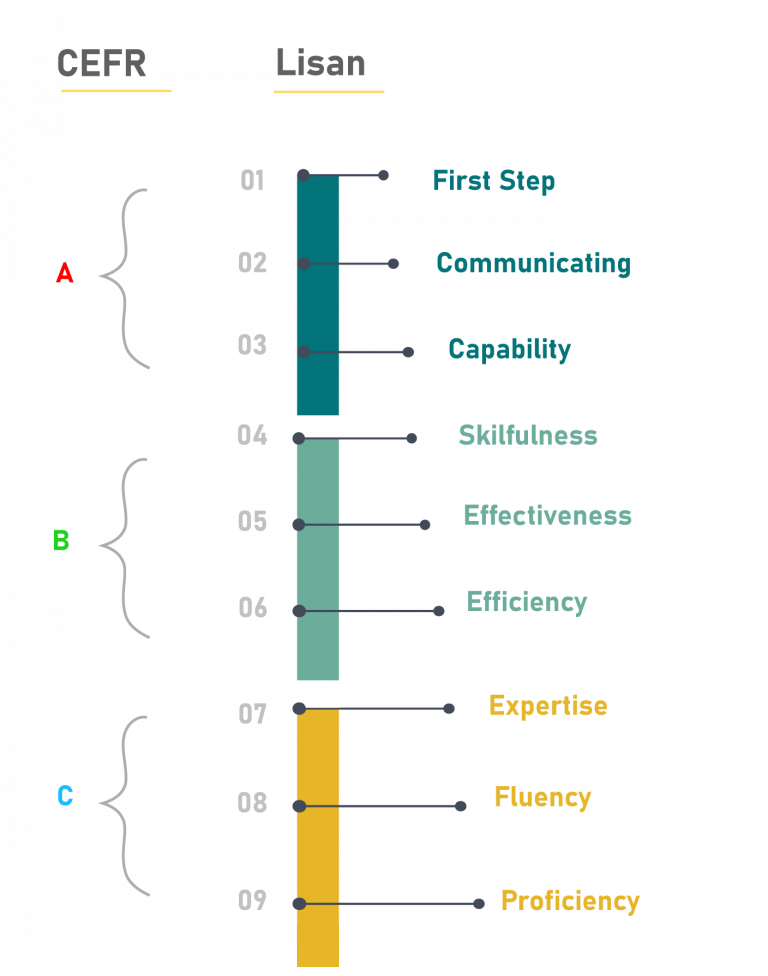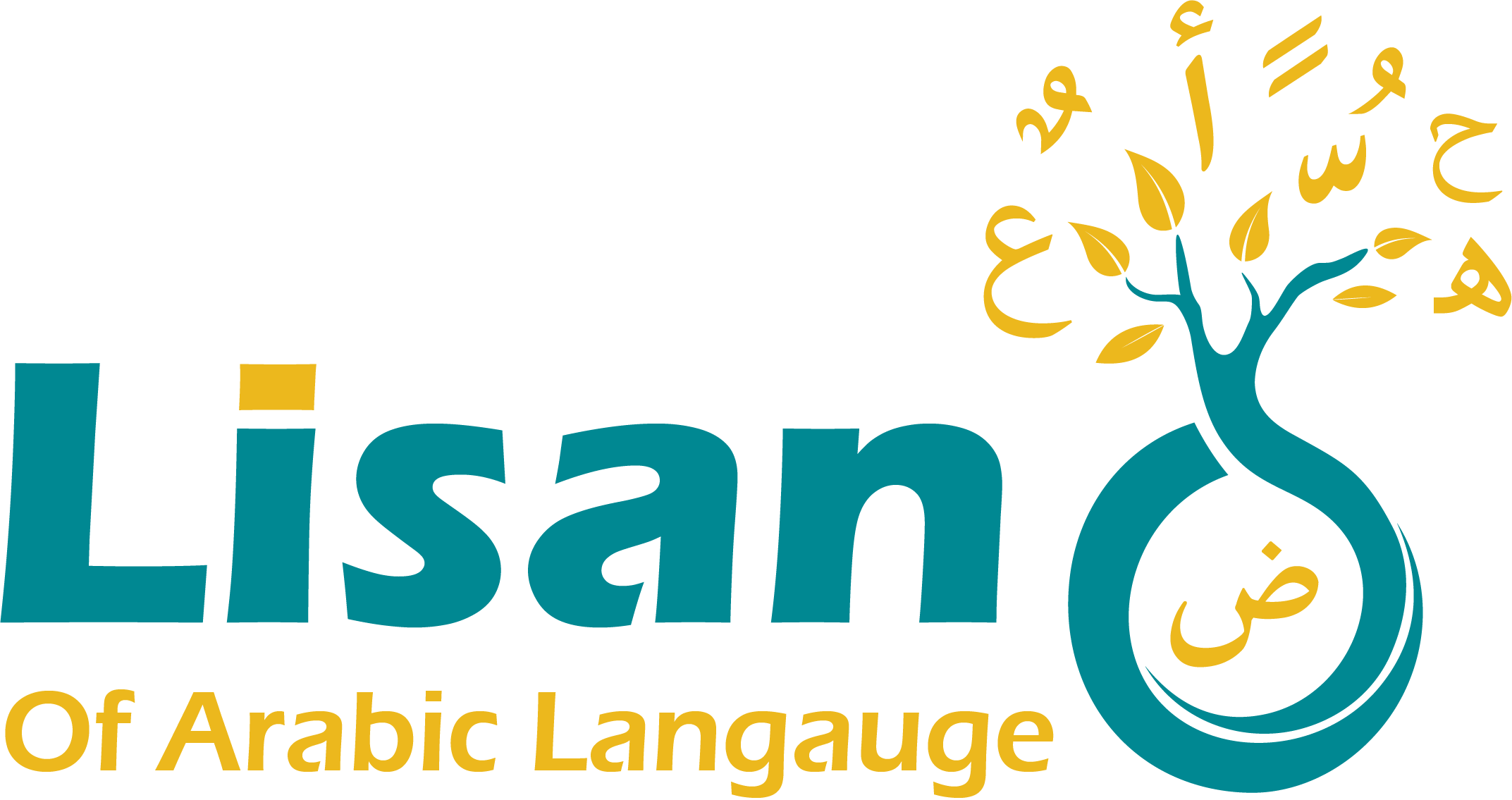
Lisan of Arabic language provides Arabic programs and courses broken down into 9 levels, on a scale from 1 (First step) to 9 (Proficiency). The critical milestones in the program are; three, six and nine. The completion of these levels clearly display your standing in the Arabic Language in accordance to our methodology, and framework. Our level structure matches The Common European Framework of Reference for Languages (CEFR).
Arabic Language Levels at Lisan
- Understand short, very simple questions that they are delivered slowly and clearly and accompanied by visuals or manual gestures to support understanding and repeated if necessary.
- Recognise every day and common words that delivered clearly and slowly in a clearly defined, familiar, everyday context.
- Recognise numbers, prices, dates and days of the week, times and places in very simple notes and text messages from friends or colleagues.
- Produce short phrases about themselves, giving basic personal information (e.g., name, address, family, nationality).
- Understand simple everyday directing signs such as Parking, closed, open.. Etc.
Describe him/herself (e.g., name, age, family), using simple words and formulaic expressions, provided he/she can prepare in advance.
Interact in a simple way provided the other person talks slowly and clearly and is prepared to help.
Communicate in a simple and routine task requiring a simple and direct exchange of information on familiar and routine matters.
Ask and answer questions about him/herself and daily routines, using short, formulaic expressions and relying on gestures to reinforce the information.
Introduce him/herself and others and ask and answer questions about personal details such as where he/she lives, people he/she knows and things he/she has.
Express a simple feeling using simple words like ‘happy’, ‘tired’, accompanied by body language.
Understand numbers of familiar words and greetings and recognise key information, and use some basic, formulaic expressions such as ‘Yes,’ ‘No,’ ‘Excuse me,’ ‘Please,’ ‘Thank you,’ ‘No thank you,’ ‘Sorry’, and provided speech is delivered very slowly, with repetition if necessary.
Able to understand sentences and frequently used expressions related to areas of most immediate relevance (e.g., very basic personal and family information, shopping, local geography, employment).
Able to use numbers, prices, dates and days of the week, times and places in very simple notes and texts.
Able to use familiar everyday expressions and very basic phrases aimed at the satisfaction of needs of a particular type.
Able to describe in simple terms aspects of his/her background, immediate environment and matters in areas of immediate need.
Able to build complete Arabic sentences includes frequently used expressions related to areas of most relevance in this level.
Understand the main points of clear standard input on familiar matters regularly encountered in work, school, leisure, etc.
Deal with most situations likely to arise whilst travelling in an area where the Arabic language is spoken.
Produce simple connected text on topics which are familiar or of personal interest.
Describe experiences and events, dreams, hopes and ambitions and briefly give reasons and explanations for opinions and plans.
Understand straightforward factual information about common every day or job-related topics, identifying both general messages and specific details, provided speech is clearly articulated in a generally familiar accent.
Understand the applications of grammar to texts and linguistic contexts relevant to the topics identified for this level.
Can reasonably fluently sustain a straightforward description of one of a variety of subjects within his/her field of interest, presenting it as a linear sequence of points.
Understand the main points of clear standard speech on familiar matters regularly encountered in work, school, leisure etc., including short narratives.
Produce clear, detailed text on a wide range of subjects and explain a viewpoint on a topical issue giving the advantages and independent disadvantages of various options.
Understand the main ideas of complex text on both concrete and abstract topics, including technical discussions in his/her field of specialisation.
Interact with acceptable degree of fluency and spontaneity that makes regular interaction with native speakers quite possible without strain for either party.
Understand the main ideas of propositionally and linguistically complex speech on both concrete and abstract topics delivered in standard speech, including technical discussions in his/her field of specialisation.
Understand articles and reports concerned with contemporary problems in which the writers adopt particular stances or viewpoints.
Writing straightforward connected texts on a range of familiar subjects within his/her field of interest, by linking a series of shorter discrete elements into a linear sequence.
Can clearly express feelings about something experienced and give reasons to explain those feelings.
Can give straightforward descriptions on a variety of familiar subjects within his field of interest.
Can reasonably fluently relate a straightforward narrative or description as a linear sequence of points.
Can give detailed accounts of experiences, describing feelings and reactions.
Can relate the plot of a book or film and describe the reactions.
Can describe dreams, hopes, ambitions, events, real or imagined.
Can narrate a story.
Can understand standard spoken language, live or broadcast on both familiar and unfamiliar topics normally encountered in personal, social, academic or vocational life. Only extreme background noise, inadequate discourse structure and/or idiomatic usage influence the ability to understand.
Can understand the main ideas of propositionally and linguistically complex speech on both concrete and abstract topics delivered in standard speech, including technical discussions in his/her field of specialisation.
Can follow extended speech and complex lines of argument provided the topic is reasonably familiar, and the direction of the talk is sign-posted by explicit markers.
Can obtain information, ideas and opinions from highly specialised sources within his/her field.
Can understand specialised articles outside his/her field, provided he/she can use a dictionary occasionally to confirm his/her interpretation of terminology.
Can understand articles and reports concerned with contemporary problems in which the writers adopt particular stances or viewpoints.
Can recognise when a text provides factual information and when it seeks to convince readers of something.
Can recognise different structures in discursive text: contrasting arguments, problem-solution presentation and cause-effect relationships.
Can understand lengthy, complex instructions in his/her field, including details on conditions and warnings, provided he/she can reread difficult sections.
Can read with a large degree of independence, adapting style and speed of reading to different texts and purposes, and using appropriate reference sources selectively. Has a broad active reading vocabulary.
- Give a clear, detailed descriptions on a wide range of subjects related to his/her field of interest.
- Describe the personal significance of events and experiences in detail.
- Can follow the essentials of lectures, talks and reports and other forms of academic/professional presentation which are propositionally and linguistically complex.
Can understand the speaker’s point of view on topics that are of current interest or that relate to his/her specialised field, provided that the talk is delivered in standard spoken language.
Can follow complex lines of argument in a clearly articulated lecture provided the topic is reasonably familiar.
Can write clear, detailed descriptions on a variety of subjects related to his/her field of interest.
Can give clear, systematically developed descriptions and presentations, with appropriate highlighting of significant points, and relevant supporting detail.
Can give clear, detailed descriptions and presentations on a wide range of subjects related to his/her field of interest, expanding and supporting ideas with subsidiary points and relevant examples.
Can write clear, detailed texts on a variety of subjects related to his/her field of interest, synthesising and evaluating information and arguments from a number of sources.
Can write clear, detailed descriptions of real or imaginary events and experiences marking the relationship between ideas in clear connected text, and following established conventions of the genre concerned.
Can write clear, detailed descriptions on a variety of subjects related to his/her field of interest.
Can understand enough to follow extended speech on abstract and complex topics beyond his/her own field, though he/she may need to confirm occasional details, especially if the accent is unfamiliar.
- Can recognise a wide range of idiomatic expressions and colloquialisms, appreciating register shifts.
Can follow extended speech even when it is not clearly structured and when relationships are only implied and not signalled explicitly.
Can give clear, detailed descriptions and presentations on complex subjects, integrating sub themes, developing particular points and rounding off with an appropriate.
Can easily follow complex interactions between third parties in group discussion and debate, even on abstract, complex unfamiliar topics.
Can identify the attitude of each speaker in an animated discussion characterised by overlapping turns, digressions and colloquialisms that is delivered at a natural speed in accents that are familiar to the listener.
Can follow most lectures, discussions and debates with relative ease.
Can extract specific information from poor quality, audibly distorted public announcements e.g. in a station, sports stadium etc.
Can understand complex technical information, such as operating instructions, specifications for familiar products and services.
Can understand a wide range of recorded and broadcast audio material, including some non-standard usage, and identify finer points of detail including implicit attitudes and relationships between speakers.
Can express him/herself fluently and spontaneously, almost effortlessly. Has a good command of a broad lexical repertoire allowing gaps to be readily overcome with circumlocutions. There is little obvious searching for expressions or avoidance strategies; only a conceptually difficult subject can hinder a natural, smooth flow of language.
Can use language flexibly and effectively for social purposes, including emotional, allusive and joking usage.
Can easily follow and contribute to complex interactions between third parties in group discussion even on abstract, complex unfamiliar topics.
Can easily keep up with the debate, even on abstract, complex unfamiliar topics.
Can argue a formal position convincingly, responding to questions and comments and answering complex lines of counter argument fluently, spontaneously and appropriately.
Can participate fully in an interview, as either interviewer or interviewee, expanding and developing the point being discussed fluently without any support, and handling interjections well.
Can argue a case on a complex issue, formulating points precisely and employing emphasis effectively.
Can develop an argument systematically in well-structured speech, taking into account the interlocutor’s perspective, highlighting significant points with supporting examples and concluding appropriately.
Can give a clear, well-structured presentation of a complex subject, expanding and supporting points of view at some length with subsidiary points, reasons and relevant examples.
Can structure a longer presentation appropriately in order to help the audience follow the sequence of ideas and understand the overall argumentation.
Can reformulate questions if these are misunderstood.
Can make critical remarks or express disagreement diplomatically.
Can engage in real-time online exchanges with several participants, understanding the communicative intentions and cultural implications of the various contributions.
Can participate effectively in live, online professional or academic discussion, asking for and giving further clarification of complex, abstract issues as necessary.
Can adapt his/her register according to the context of online interaction, moving from one register to the other within the same exchange if necessary.
Can evaluate, re-state and challenge arguments in professional or academic live online chat and discussion.
Can write clear, well-structured expositions of complex subjects, underlining the relevant salient issues.
Can expand and support points of view at some length with subsidiary points, reasons and relevant examples.
Can write a suitable introduction and conclusion to a longer report, article or dissertation on a complex academic or professional topic provided that the topic is within his/her field of interest and there are opportunities for redrafting and revision.
Can backtrack when he/she encounters a difficulty and reformulate what he/she wants to say without fully interrupting the flow of speech.
Can self-correct with a high degree of effectiveness.
Can understand with ease virtually any kind of spoken language, whether live or broadcast, delivered at fast natural speed.
Can produce clear, smoothly flowing well-structured speech with an effective logical structure which helps the recipient to notice and remember significant points.
Can follow specialised lectures and presentations employing colloquialism, regional usage or unfamiliar terminology.
Can get the point of jokes or allusions in a presentation.
Has a good command of idiomatic expressions and colloquialisms with awareness of connotative levels of meaning.
Can advise on or talk about sensitive issues without awkwardness, understanding colloquial references and dealing diplomatically with disagreement and criticism.
Can hold his/her own in formal discussion of complex issues, putting an articulate and persuasive argument, at no disadvantage to other speakers.
Can deal with hostile questioning confidently, hold on to his/her turn to speak and diplomatically rebut counter-arguments.
Can use telecommunications confidently and effectively for both personal and professional purposes, even if there is some interference or the caller has a less familiar accent.
Can understand any interlocutor, even on abstract and complex topics of a specialist nature beyond his/her own field, given an opportunity to adjust to a less familiar accent.
Can present a complex topic confidently and articulately to an audience unfamiliar with it, structuring and adapting the talk flexibly to meet the audience’s needs.
Can write clear, smoothly flowing, complex texts in an appropriate and effective style and a logical structure which helps the reader to find significant points.
Can express him/herself in an appropriate tone and style in virtually any type of formal and informal written interaction.
Can write clear, smoothly flowing and engaging stories and descriptions of experience in a style appropriate to the genre adopted.
Can express him/herself with clarity and precision in real-time online discussion, adjusting language flexibly and sensitively to context, including emotional, allusive and joking usage.
Can anticipate and deal effectively with possible misunderstandings (including cultural ones), communication issues and emotional reactions occurring in an online discussion.
Can produce clear, smoothly flowing, complex reports, articles or essays which present a case, or give critical appreciation of proposals or literary works.

Placement Test
Take 24 minutes to see where you stand on the Arabic language scale. It’s a free Online Arabic Level Test which was prepared by Lisan to help you understand your Arabic level with accuracy.

